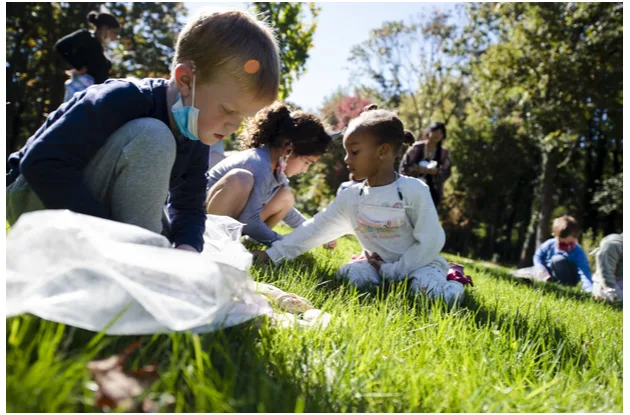Education experts from the Nassau County, Long Island, area weigh in on how parents can establish a positive relationship with their child’s teachers, thus ensuring their child’s long-term success in school.
 School experiences for children and parents alike can run the gamut from “the time of my life” to dread and avoidance. Generally, the better the communication that exists between the parents and the school staff, be it administrators, teachers, or aides, the healthier (and happier) all parties will be – most notably, the child.
School experiences for children and parents alike can run the gamut from “the time of my life” to dread and avoidance. Generally, the better the communication that exists between the parents and the school staff, be it administrators, teachers, or aides, the healthier (and happier) all parties will be – most notably, the child.
“Good communication between parents and teachers or tutors is paramount,” says Judy Suchman, director of the Chappaqua Learning Center. Often “parents can have expectations for their child that may differ markedly from the teacher’s,” she adds.
Bridging that divide-and doing so positively-is one of the most beneficial things parents can do to ensure their child’s long-term success in school. It sets the stage for future education. “Teachers and parents alike need to remind themselves that both parties are only interested in doing the very best for the child, no matter how information is communicated,” says Linda Gardiner of The Green Vale School. “I tell teachers to listen to what is being said, not necessarily how it is being communicated. Even in the heat of a passionate dialogue with a parent, there is probably some shred of truth in the parent’s concerns.” She suggests that everyone follow the “Golden Rule” and think about how they themselves would like to be treated.
Many schools have policies and cultures in place that promote good communication, and it is important for parents to keep that in mind when deciding where to place your children. No matter where you send your child for his education, though, there are things you can do to help you make the most of the parent-teacher relationship.
We asked local experts:
What advice can you give to foster better parent-teacher relationships?
“Every parent wants to know how their child’s day was. Speaking to teachers at drop-off or pick-up is fine for a quick hello, but that is not the time to discuss anything serious. If you need the teacher to know about a schedule change, do it in writing. Also, be careful speaking to teachers about sensitive matters in front of your child. Little ears can be big ears!
The best way to get information from your child’s teacher is to write a note! Specify in your note what you want to speak about and when you might be available for a phone call. That way the teacher can call you back when they have time to speak to you and you have time as well. If the teacher is rushed, you may not get all of your questions answered. Also, if the teacher knows what you want to talk about, he or she can be prepared to help.
Some teachers frequently check email and some don’t. Check with your school regarding their email policy, and double-check with the teachers as well. Email is a perfectly acceptable method of communication if both parties agree to it.”
– Allison Okun, assistant director of early childhood services, Sid Jacobson JCC, East Hills
“In order for a child to succeed in school and in life, she needs parents and teachers who communicate and support each other with regard to what they’re teaching in their separate domains. True learning is experiential and extends to other facets of life.
Parents and staff at Mill Neck Manor School together strive to ensure that the focus is always on the child. Successful communication is essential, the only way that we can guarantee a child will progress and work to her fullest potential – and it’s an important part of everyone’s job.
Some tips for parents that we’ve garnered over the years:
– Begin all communication with a positive attitude and a willingness to listen.
– Be partners with your teachers.
– Get comfortable within the school and with the teacher
– Feel free to make the first contact with teachers.
– Communicate with each other early in the school year. Start by setting up everyone’s expectations for the child on the first day.
– Communicate often. Create a system that will work for both of you and that supplies ample information between home and school
– Follow through with what you said you would do – commitments are important and create a sense of credibility and trust.
Over the years our school, through workshops, parent support groups, surveys, and continual communication, has also developed a list to help teachers work effectively with parents – and knowing these teacher expectations, I think, can help a parent understand how to navigate that relationship. We tell teachers:
– All families have strength.
– Parents can learn new techniques if encouraged and if they understand it’s worth it.
– Parents have important perspectives about their children – so stop, listen, and then act.
– Most parents really care about their children; give them the credit and respect they deserve.
– Cultural differences are both valid and valuable. Ask about a family’s background and how it impacts a child’s education and growth.
All the experiences children have, both in and out of school, help shape their sense that someone cares about them, their feelings of self-worth and competency, their understanding of the world around them, and their beliefs about where they fit into the scheme of things.”
– Francine Atlas Bogdanoff, assistant superintendent, Mill Neck Manor School for the Deaf and Mill Neck Manor Early Childhood Center
“To foster better parent /teacher relationships, parents should make an appointment to see a teacher and not just drop in. Teachers’ primary role is to care for their students – so when parents drop in, it takes time and attention away from those who really need it, the kids.
When you do end up going in to speak with a teacher, try to do so with an open mind, knowing that of course you have valuable insights to share with the teacher, but also that he or she has important observations to share with you. A child’s performance and behavior in a classroom with 15+ children is apt to be different than his behavior seen at home. A student’s ability to recall information may be stronger at home without the distractions of peers or the stress of being called upon by a teacher. So, yes, your child may be able to solve a math problem at home with relative ease; but when he gets to school everything he studied may have seemingly disappeared overnight.
Out of respect, please turn off your cell phone or Blackberry during a school conference, and do not start domestic arguments or the blame game in front of the teacher; this is awkward and stressful for teachers.
Email is a fast and easy mode of communication and can be effectively used in education. Parents should listen carefully to teachers at the start of the year to the school’s email policy. Email can be effective but please understand that a teacher’s job is to work with your child, not to be online answering emails. I suggest that teachers get back to parents within 24 hours, but such immediate responses only train parents to believe you are connected all day long. Some teachers are amazingly quick at responding to parent emails, and others have a different focus during the day. As effective and fast as email may be, there is the underbelly of the beast as well: one cannot hear tone or emphasis in a written message, so there is a chance for misunderstanding or incorrect assumptions. Another email consideration is that cc’ing a spouse or administrator can heighten the tension. (Remember, too, that whatever one writes can be easily forwarded, so use good sense!)
If parents do not believe they are getting an adequate or timely response, give the teacher a call, or email again. If there is still no response, contact the principal. Before doing this, though, think about whether your question needs to be brought to the next level. Can you find the answer via a friend? A registered lettered is not a great option when trying to get a teacher’s attention – there are lots of things to do prior to that option.
The Golden Rule works like a charm in parent/teacher relationships – just put yourself in the other’s shoes. A great opener is always, “Help me understand…”. See yourself and the teacher as allies.”
– Linda Gardiner, assistant head of school and director of the Lower School, The Green Vale School
“We strive to achieve full partnerships with families by maintaining open communication. We are open to feedback, and ask that parents also understand that we are committed to the children by serving as a resource to them as well. Boundaries are maintained by always ensuring the best interest of the child.
Our school uses daily communication sheets as a tool. Parents complete a form upon drop-off, which shares information about their child’s routines from the night and morning before (example, slept well, current mood, last diaper change, etc.). Teachers use this same form to communicate the happenings of the day, including basic needs (diaper changes, feedings, naps) and learning experiences. These help keep parents well informed about the child’s routines and overall growth in the classroom. We also welcome parents as experts on their children and encourage teachers and parents to work together as partners to set goals that correspond to their child’s emerging interests, needs, and strengths. This occurs through formal and informal conversations about the child’s progress in our program.
In the instance where a parent feels she needs assistance getting a quicker response from a teacher, she should feel comfortable mentioning it and requesting a specific timeframe for an answer. Understanding that this may not always be the case, a parent should always feel comfortable to speak with the director, in our case, or anyone higher up who will actively help assist with the question and ways to help improve communication between the teacher and parent moving forward.”
– Ingrid Gutierrez, center director, Bright Horizons, Woodbury
“Teachers care about your child and how he or she is doing in school. We also understand that you are really concerned about your child. Some ways are more effective than others at communicating about your child’s progress, though.
Certain things that do not work: “catching” us in the hall as we prepare for the day, or approaching the principal first, before reaching out to the teacher.
What I do suggest is: Send a note into school with your child, or call school to schedule some time with the teacher to discuss your child either by phone or at a person-to-person meeting. This ensures that the teacher is focused on only one thing: your child. And be positive, not threatening, so we can work together.”
– Michele Anselmo, teacher, Center for Science Teaching & Learning (CSTL) Education Initiatives, Rockville Centre
See more advice from other area experts.





















